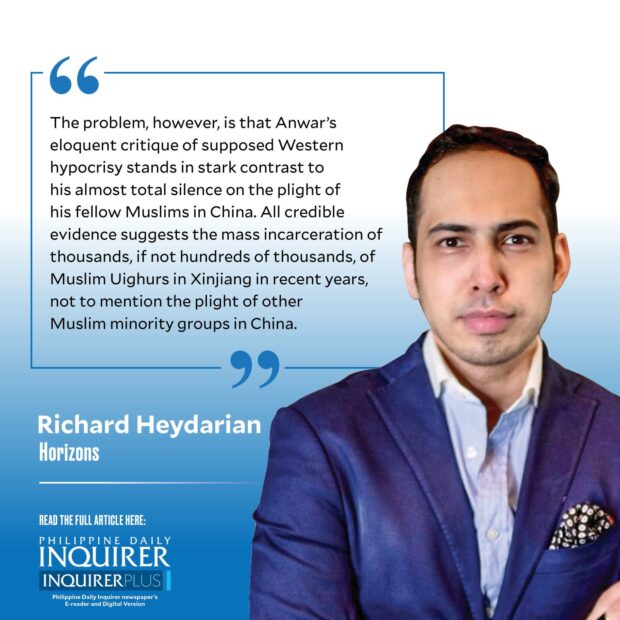À la carte diplomacy and its discontents

Berlin—”Why this hypocrisy? Why this selective and ambivalent attitude towards one race and another? Is it because they are colored or they are a different religion?” Malaysian Prime Minister Anwar Ibrahim thundered during a testy press conference with his German counterpart, Olaf Scholz, in Berlin.
Anwar accused his hosts of being “one-sided” in approaching the ongoing war in Gaza, effectively ignoring the historic rights and humanity of indigenous Palestinians. Given his country’s fraught history—and its horrendous treatment of the Jewish people that took a genocidal form during the Holocaust—Scholz has repeatedly emphasized post-war Germany’s historical responsibility to and, accordingly, its iron-clad solidarity with Israel.
To be fair, Europe has historically been a major source of development and humanitarian aid to Palestinians in the Occupied Territories. Crucially, top European leaders, most notably the European Union’s foreign affairs chief, Josep Borrell, have also repeatedly warned against potential war crimes in Gaza.
Earlier this month, Borrell went even a step further by alleging, during a UN Security Council speech, that “[s]tarvation is being used as [an instrument of] war and when we condemn this happening in Ukraine, we have to use the same words for what is happening in Gaza.”
Even the German leader has stepped up his stance on the issue. Following his recent meeting with Israeli Prime Minister Benjamin Netanyahu, Scholz made it clear that, “We cannot stand by and watch Palestinians risk starvation … That’s not us. That is not what we stand for.” Acknowledging the “desperate” conditions in Gaza, he directly questioned his host’s overall conduct and strategic objectives by openly asking, “No matter how important the goal can it justify such terribly high costs, or are there other ways to achieve your goal?”
The German chancellor also criticized Israel’s assault on the Gaza city of Rafah, which borders Egypt, and warned of dire consequences for huge numbers of Palestinian refugees: “How should more than 1.5 million people be protected? Where should they go?” Crucially, during his talks with King Abdullah of Jordan, the German chancellor called for “a long-lasting ceasefire,” but reiterated his country’s position that “Israel has every right to protect itself.”
Germany’s seemingly nuanced position, and its refusal to call for an immediate ceasefire during the early days of the latest conflict in Gaza, has been met with criticism around the world. If anything, many have accused Europe of “double standard” by highlighting the seeming asymmetry of sympathy for the plight of Ukrainian and Palestinian civilians.
No wonder then that Anwar’s speech went down well at home and among many international observers. The British-American journalist Mehdi Hasan praised the Malaysian leader for “speak[ing] for the majority of the world’s people,” while a Malaysian veteran legislator went so far as claiming “Malaysia is now one step closer to being the voice of the Islamic world.”
The problem, however, is that Anwar’s eloquent critique of supposed Western hypocrisy stands in stark contrast to his almost total silence on the plight of his fellow Muslims in China. All credible evidence suggests the mass incarceration of thousands, if not hundreds of thousands, of Muslim Uighurs in Xinjiang in recent years, not to mention the plight of other Muslim minority groups in China.
Add to this, the shameless silence of countless Global South leaders on Russia’s brazen invasion of Ukraine, a smaller sovereign neighbor, in clear violation of international law. Moreover, Anwar has rapidly replaced former Philippine president Rodrigo Duterte as the chief apologist for China in regional fora. Instead of standing in solidarity with neighboring Philippines amid China’s ongoing bullying tactics in the South China Sea, the Malaysian leader has taken up the cudgels against supposed “China-phobia” in global gatherings, most notably the recently concluded Asean-Australia special summit in Melbourne.
Two decades ago, US state department director for policy planning Richard Haass tried to sanitize the Bush administration’s brazen unilateralism as “à la carte multilateralism.” Nowadays, strategic opportunism and hypocrisy are couched in the language of “à la carte diplomacy.”
The bitter reality, however, is that the West has been rewarding strategic opportunism by pouring massive investments into so-called “multi-aligned” nations—Vietnam, Malaysia, Turkey, and India—at the expense of frontline states such as the Philippines, which have stood up for international law and democracy in one of the world’s most vital theaters.
rheydarian@inquirer.com.ph




















